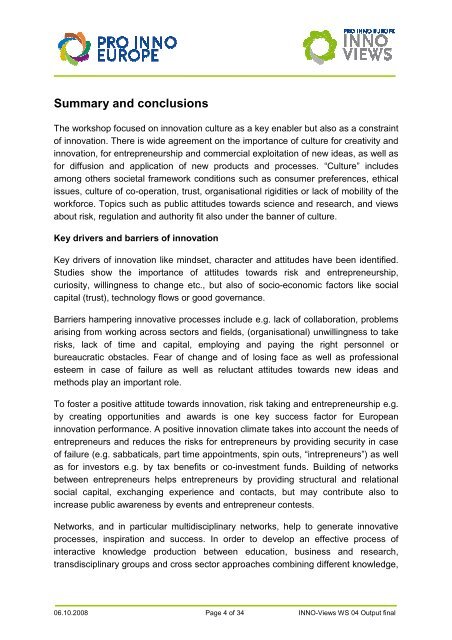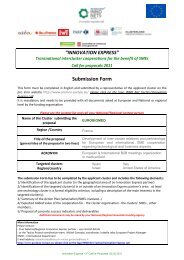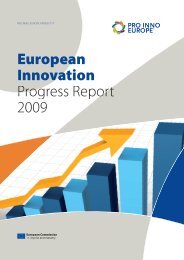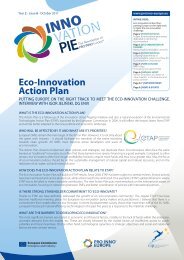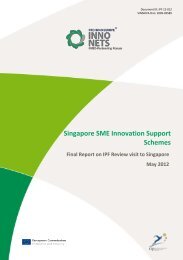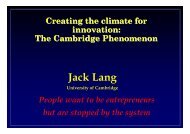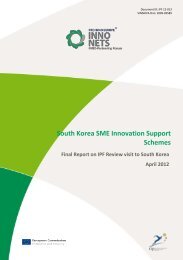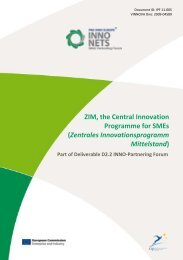The workshop in brief - PRO INNO Europe
The workshop in brief - PRO INNO Europe
The workshop in brief - PRO INNO Europe
Create successful ePaper yourself
Turn your PDF publications into a flip-book with our unique Google optimized e-Paper software.
Summary and conclusions<br />
<strong>The</strong> <strong>workshop</strong> focused on <strong>in</strong>novation culture as a key enabler but also as a constra<strong>in</strong>t<br />
of <strong>in</strong>novation. <strong>The</strong>re is wide agreement on the importance of culture for creativity and<br />
<strong>in</strong>novation, for entrepreneurship and commercial exploitation of new ideas, as well as<br />
for diffusion and application of new products and processes. “Culture” <strong>in</strong>cludes<br />
among others societal framework conditions such as consumer preferences, ethical<br />
issues, culture of co-operation, trust, organisational rigidities or lack of mobility of the<br />
workforce. Topics such as public attitudes towards science and research, and views<br />
about risk, regulation and authority fit also under the banner of culture.<br />
Key drivers and barriers of <strong>in</strong>novation<br />
Key drivers of <strong>in</strong>novation like m<strong>in</strong>dset, character and attitudes have been identified.<br />
Studies show the importance of attitudes towards risk and entrepreneurship,<br />
curiosity, will<strong>in</strong>gness to change etc., but also of socio-economic factors like social<br />
capital (trust), technology flows or good governance.<br />
Barriers hamper<strong>in</strong>g <strong>in</strong>novative processes <strong>in</strong>clude e.g. lack of collaboration, problems<br />
aris<strong>in</strong>g from work<strong>in</strong>g across sectors and fields, (organisational) unwill<strong>in</strong>gness to take<br />
risks, lack of time and capital, employ<strong>in</strong>g and pay<strong>in</strong>g the right personnel or<br />
bureaucratic obstacles. Fear of change and of los<strong>in</strong>g face as well as professional<br />
esteem <strong>in</strong> case of failure as well as reluctant attitudes towards new ideas and<br />
methods play an important role.<br />
To foster a positive attitude towards <strong>in</strong>novation, risk tak<strong>in</strong>g and entrepreneurship e.g.<br />
by creat<strong>in</strong>g opportunities and awards is one key success factor for <strong>Europe</strong>an<br />
<strong>in</strong>novation performance. A positive <strong>in</strong>novation climate takes <strong>in</strong>to account the needs of<br />
entrepreneurs and reduces the risks for entrepreneurs by provid<strong>in</strong>g security <strong>in</strong> case<br />
of failure (e.g. sabbaticals, part time appo<strong>in</strong>tments, sp<strong>in</strong> outs, “<strong>in</strong>trepreneurs”) as well<br />
as for <strong>in</strong>vestors e.g. by tax benefits or co-<strong>in</strong>vestment funds. Build<strong>in</strong>g of networks<br />
between entrepreneurs helps entrepreneurs by provid<strong>in</strong>g structural and relational<br />
social capital, exchang<strong>in</strong>g experience and contacts, but may contribute also to<br />
<strong>in</strong>crease public awareness by events and entrepreneur contests.<br />
Networks, and <strong>in</strong> particular multidiscipl<strong>in</strong>ary networks, help to generate <strong>in</strong>novative<br />
processes, <strong>in</strong>spiration and success. In order to develop an effective process of<br />
<strong>in</strong>teractive knowledge production between education, bus<strong>in</strong>ess and research,<br />
transdiscipl<strong>in</strong>ary groups and cross sector approaches comb<strong>in</strong><strong>in</strong>g different knowledge,<br />
06.10.2008 Page 4 of 34 <strong>INNO</strong>-Views WS 04 Output f<strong>in</strong>al


